How Adaptogens Like Ashwagandha and Rhodiola Can Help You Stay Calm
Introduction: Stress in a Modern World 🌍
Life today feels like it moves at lightning speed. Between work deadlines, social expectations, health worries, and constant notifications, it’s no wonder so many people experience daily stress and anxiety. While therapy, mindfulness, and lifestyle changes are essential, natural remedies like adaptogens have gained attention for their ability to help the body handle stress more effectively.
Among the most researched adaptogens are Ashwagandha and Rhodiola Rosea. These herbs have been used for centuries in traditional medicine and are now backed by modern science for their stress-regulating, mood-stabilizing, and energy-balancing benefits.
In this article, we’ll explore:
🌱 What adaptogens are and how they work
🌱 The unique benefits of Ashwagandha and Rhodiola for stress and anxiety
🌱 The science behind their effects on the brain, cortisol, and nervous system
🌱 Supplementation tips, potential side effects, and best practices
🌱 Lifestyle practices (like breathwork and nutrition) that enhance their calming effects
Let’s dive in!
Looking for supplements for people with Social Anxiety? Click here.
🌱 What Are Adaptogens?
Adaptogens are a class of herbs and natural substances that help the body adapt to stress. Unlike stimulants or sedatives, adaptogens work by balancing systems in the body, particularly the hypothalamic-pituitary-adrenal (HPA) axis, which regulates your stress response.
👉 Key features of adaptogens:
Non-toxic: Safe for long-term use in moderate doses.
Balancing: Normalize rather than overstimulate or suppress.
Stress-regulating: Help the body respond more calmly to both physical and emotional stressors.
Some popular adaptogens include:
Ashwagandha 🌿
Rhodiola Rosea 🌸
Holy Basil (Tulsi) 🌺
Ginseng 🪷
Schisandra 🍒
But in this article, we’ll focus on Ashwagandha and Rhodiola, two of the most powerful adaptogens for calming anxiety and improving resilience.
🌿 Ashwagandha: The Ancient Stress-Reliever

Ashwagandha (Withania somnifera), sometimes called “Indian ginseng,” has been used in Ayurvedic medicine for over 3,000 years. It is best known for its ability to lower stress, calm the mind, and support overall vitality.
✨ Benefits of Ashwagandha for Stress and Anxiety
Reduces Cortisol Levels 🧪: Studies show Ashwagandha can lower cortisol (the main stress hormone) by up to 30%.
Supports Sleep Quality 😴: Helps regulate circadian rhythm, promoting deeper, restorative sleep.
Balances Mood 🌈: Boosts GABAergic activity, which calms the nervous system.
Improves Focus & Memory 🧠: Supports cognitive performance under stress.
🧪 What the Science Says
A 2019 study published in Medicine (Baltimore) found that participants taking 300 mg of Ashwagandha twice daily had significant reductions in stress and anxiety scores, along with lower cortisol.
Another study showed that Ashwagandha improved sleep quality and mental alertness in people struggling with stress-related insomnia.
🌿 Best Forms & Dosages
Extract form (withanolides 5–10%): 300–600 mg daily
Root powder: 1–2 grams daily
Best taken in the evening to promote calm and sleep.
🌸 Rhodiola Rosea: The Energy-Balancing Herb
Rhodiola Rosea, also known as “golden root,” grows in cold, high-altitude regions like Siberia and Scandinavia. Traditionally used to fight fatigue and improve endurance, Rhodiola is now recognized for its ability to calm the mind while boosting resilience.
✨ Benefits of Rhodiola for Stress and Anxiety
Reduces Fatigue ⚡: Especially stress-related fatigue that causes mental fog.
Balances Serotonin and Dopamine 🧠: Helps regulate mood and motivation.
Enhances Cognitive Function 📚: Improves concentration and memory under stress.
Prevents Burnout 🔥: Supports nervous system balance in high-pressure situations.
🧪 What the Science Says
A study published in Phytomedicine found that people with stress-related fatigue who took 400 mg of Rhodiola daily for 4 weeks experienced reduced anxiety, better focus, and more energy.
Other clinical trials show Rhodiola may improve resilience in students, athletes, and professionals under pressure.
🌸 Best Forms & Dosages
Standardized extract (3% rosavins, 1% salidroside)
Typical dosage: 200–400 mg daily
Best taken in the morning or early afternoon (it can be energizing).
🌿✨ Ashwagandha vs. Rhodiola: Which One Is Best?

Both herbs are powerful, but they act slightly differently:
Ashwagandha → calming, grounding, sleep-supportive 🌙
Rhodiola → energizing, motivating, stress-resilient ☀️
👉 Many people benefit from combining them:
Morning: Rhodiola for focus and resilience
Evening: Ashwagandha for calm and rest
Looking for supplements for people with Social Anxiety? Click here.
🌬️ Enhancing Adaptogen Benefits with Breathwork
Adaptogens work on the HPA axis to regulate stress, and you can amplify their effects with breathwork.
Want to try Breathwork? Click Here.
Box Breathing (4-4-4-4): Inhale 4, hold 4, exhale 4, hold 4. Calms the nervous system.
Diaphragmatic Breathing: Deep belly breaths that stimulate the vagus nerve, reducing anxiety.
Alternate Nostril Breathing (Nadi Shodhana): Balances left and right brain activity, easing anxious thoughts.
🧘 Try combining Ashwagandha in the evening with 10 minutes of breathwork to improve relaxation and sleep.
Looking for online therapy for people with Social Anxiety? Click Here.
🥗 Nutrition and Adaptogens: A Perfect Pair
Diet plays a massive role in stress regulation. To maximize adaptogen benefits:
Eat magnesium-rich foods (leafy greens, nuts, seeds) 🥬
Boost omega-3 intake (salmon, flax, chia) 🐟
Choose complex carbs (sweet potatoes, quinoa) for stable blood sugar 🌾
Limit stimulants (caffeine, sugar) that spike cortisol 🚫
Pairing adaptogens with a balanced diet creates a foundation for calmer moods and greater resilience.
🧘 Therapy and Lifestyle Practices That Work With Adaptogens
Adaptogens are powerful, but they work best as part of a holistic lifestyle.
Cognitive Behavioral Therapy (CBT) 🧠: Helps reframe anxious thoughts.
Mindfulness & Meditation 🧘: Improves emotional regulation.
Exercise 🏋️: Lowers cortisol, boosts endorphins.
Sleep Hygiene 😴: Deep sleep helps adaptogens do their job better.
Looking for online therapy for people with Social Anxiety? Click Here.
⚠️ Possible Side Effects & Safety
Both Ashwagandha and Rhodiola are generally safe, but some precautions apply:
Ashwagandha: Avoid in pregnancy, autoimmune thyroid disorders (unless supervised).
Rhodiola: May cause jitteriness if overused; avoid taking late at night.
Always consult a doctor if you’re on antidepressants, thyroid medication, or blood pressure drugs.
🌟 Daily Adaptogen Routine for Calm and Balance

If you’re looking to naturally manage stress and anxiety, here’s a gentle way to structure your day with adaptogens and supportive habits:
🌅 Morning:
Take Rhodiola (200–300 mg) to boost focus, energy, and resilience.
Pair it with light exercise and a few minutes of breathwork to set a calm yet energized tone for the day.
🌤️ Afternoon:
Enjoy a balanced meal with protein and healthy fats to keep blood sugar stable.
Swap coffee for green tea or matcha, which combine gentle caffeine with L-theanine for smooth, calm alertness.
🌙 Evening:
Take Ashwagandha (300–600 mg) to ease tension and support deep relaxation.
Wind down with journaling, meditation, or a warm bath to prepare your body and mind for restful sleep.
✨ Following this rhythm helps you stay focused and resilient during the day while inviting peace and recovery at night.
Conclusion 🌿💚
Adaptogens like Ashwagandha and Rhodiola Rosea aren’t just herbal trends—they are science-backed allies in the fight against chronic stress and social anxiety. By helping regulate cortisol, supporting neurotransmitter balance, and boosting resilience, these herbs can make you feel calmer, more focused, and more in control.
When paired with nutrition, breathwork, and therapy, adaptogens become part of a holistic natural toolkit for emotional balance and confidence.
📚 References
Lopresti, A. L., Smith, S. J., Malvi, H., & Kodgule, R. (2019). An investigation into the stress-relieving and pharmacological actions of ashwagandha. Medicine (Baltimore), 98(37).
Panossian, A., Wikman, G., & Sarris, J. (2010). Rhodiola rosea in stress and fatigue: A systematic review. Phytomedicine, 17(7), 481–493.
Chandrasekhar, K., Kapoor, J., & Anishetty, S. (2012). A prospective, randomized double-blind study of safety and efficacy of Ashwagandha root in reducing stress and anxiety in adults. Indian Journal of Psychological Medicine, 34(3), 255–262.
Darbinyan, V., Kteyan, A., Panossian, A., et al. (2000). Rhodiola rosea extract reduces symptoms of fatigue and improves mental performance. Phytomedicine, 7(5), 365–371.
Gerbarg, P. L., & Brown, R. P. (2015). Breath practices for treatment of stress, anxiety, and depression: A review. Journal of Alternative and Complementary Medicine, 21(1), 1–7.
Related Posts
-

Nootropics That Promote Calm and Rest
Explore the world of calming nootropics — natural brain enhancers that promote relaxation, better focus, and deeper rest. Learn how L-Theanine, magnesium, ashwagandha, and other adaptogens help balance your nervous system, reduce stress, and support restorative sleep.
-

Best Natural Supplement Stack for Sleep
Discover the best natural supplement stack for deep, restorative sleep. Learn how nutrients like magnesium, L-theanine, glycine, and calming herbs such as chamomile and ashwagandha work together to relax your body, calm your mind, and improve sleep quality—naturally and safely.
-

Combining L-Theanine and Magnesium for Sleep: A Calm Night, Naturally
Discover how combining L-Theanine and Magnesium can help you drift into deep, restorative sleep. Learn how this natural duo calms the mind, relaxes the body, and supports your nervous system—without grogginess the next morning.
-

How to Sleep Better After Intense Workouts
Struggling to fall asleep after a tough workout? Learn how to optimize your post-training recovery with nutrition, hydration, and science-backed sleep strategies. Discover how to calm your nervous system, balance hormones, and wake up fully recharged for your next session.
-

Ashwagandha and Valerian: A Bedtime Combo for Deep Rest and Emotional Reset
Discover the calming synergy of Ashwagandha and Valerian root, two natural sleep aids that help quiet the mind, ease anxiety, and promote deeper rest. Learn how this herbal duo supports the nervous system, balances stress hormones, and restores emotional peace — without next-day grogginess.
-

How to Create a Resilience-Boosting Diet
Discover how to build emotional and physical strength from the inside out with a resilience-boosting diet 🍎. Learn which foods stabilize your mood, how supplements like magnesium and omega-3s strengthen your stress response, and why pairing nutrition with breathwork and therapy creates lasting calm, focus, and vitality 🌿💪.
-

Best Teas and Herbal Blends for Calmness: Nature’s Way to Restore Inner Peace
Ashwagandha, the ancient adaptogenic herb, helps your body find balance during stress. Known as “Indian ginseng,” it supports cortisol regulation, boosts energy, and restores calm clarity. Discover how this powerful root promotes resilience, emotional balance, and steady vitality — one cup at a time. 🌸
-

Parenting and Emotional Strength: How to Raise Children Without Losing Yourself
Empathy is the bridge that connects hearts — the quiet power to understand, feel, and support another’s emotions without judgment. Learn how empathy strengthens relationships, enhances communication, and cultivates deeper compassion in everyday life. 🌿
-

How to Bounce Back from Public Failure: Reclaiming Confidence, Purpose, and Power
Visualization is more than imagination — it’s brain training for resilience. By picturing calm, success, or healing, you activate the same neural pathways as real experience. Learn how daily visualization rewires your brain for confidence, emotional balance, and recovery from stress. ✨
-

Coping with Financial Stress Through Resilience: How to Stay Grounded When Money Feels Tight
Body awareness is the foundation of emotional resilience. By tuning into your body’s signals — tension, fatigue, or calm — you learn to recognize stress before it overwhelms you. Discover how mindfulness, gentle movement, and breathwork can deepen your connection with your body and restore balance from the inside out. 🧘
-

How to Stay Positive During Chronic Illness: A Guide to Emotional Strength and Hope
Creativity is more than art — it’s a form of healing. Whether through painting, writing, music, or small acts of expression, creativity helps release emotion, calm the nervous system, and reconnect you to joy. Discover how to use creativity as a tool for emotional balance, resilience, and self-discovery. 🌿
-

Resilience Tips for Caregivers: How to Stay Strong While Caring for Others
Joy isn’t the absence of pain — it’s the quiet strength to find light even in challenging times. Cultivating joy through small daily moments restores balance, releases stress, and reminds you of life’s beauty. Learn how to reconnect with authentic happiness, rebuild emotional energy, and nurture your nervous system through gratitude, presence, and play. 🌿
-

Building Resilience After a Breakup: How to Heal, Rebuild, and Rise Stronger
Social connection is one of the strongest predictors of emotional resilience. During difficult times, genuine relationships act as anchors — calming the nervous system, reducing stress hormones, and helping you regain perspective. Learn how cultivating real human connection can strengthen your mind, heart, and overall well-being. 🌿
-

How to Stay Emotionally Strong During Job Loss
Your emotions are powered by brain chemistry — a delicate balance of neurotransmitters like serotonin, dopamine, and cortisol. When these chemicals work in harmony, you feel calm, focused, and resilient. Learn how daily habits, nutrition, and mindfulness can support your brain chemistry and boost emotional well-being naturally. 🌿
-

The Role of Hormones in Emotional Stability: How Your Chemistry Shapes Your Calm
Hormones shape more than your body — they shape your emotions, resilience, and sense of calm. From cortisol to serotonin, these chemical messengers influence how you react to stress, connect with others, and recover from challenges. Learn how to balance your hormones naturally to build lasting emotional stability and harmony within. 💫
-

Mitochondria and Emotional Energy: The Cellular Power Behind Your Mood
Breathwork is one of the most powerful tools for emotional regulation and cellular balance. Through intentional breathing, you can calm your nervous system, increase oxygen flow to the brain, and even support mitochondrial energy. Learn how conscious breathing connects body and mind — transforming stress into presence and emotional strength. 🌿
-

Inflammation and Its Impact on Mood Resilience: The Silent Link Between Body and Mind
Inflammation doesn’t just affect the body — it impacts the mind. Chronic inflammation alters brain chemistry, depletes serotonin, and makes emotional recovery harder. Learn how calming inflammation through nutrition, mindfulness, and sleep can restore balance, resilience, and a renewed sense of emotional strength. 💫
-

How Antioxidants Protect Emotional Well-being: The Hidden Link Between Oxidative Stress and Mental Health
Antioxidants do more than protect your body — they defend your mind. By neutralizing oxidative stress, antioxidants support serotonin, dopamine, and brain energy pathways that keep you calm, focused, and emotionally balanced. Discover how foods like berries, green tea, and dark chocolate nourish your brain, boost mood, and strengthen resilience from the inside out. 🌿✨
-

The HPA Axis and Emotional Health: The Hidden Bridge Between Stress and Mind
Neuroplasticity — the brain’s ability to rewire and adapt — is the foundation of emotional healing and resilience. When you face stress, trauma, or change, your neural pathways can reshape themselves to support new patterns of calm, focus, and self-awareness. Learn how daily practices like mindfulness, therapy, and breathwork strengthen neuroplasticity to transform emotional pain into personal growth. 🌸
-

Why Cortisol Control Is Key to Resilience: Mastering Stress to Build Emotional Strength
Controlling cortisol — the body’s main stress hormone — is the secret to lasting resilience. When cortisol levels stay balanced, your mind becomes clearer, emotions steadier, and energy more sustainable. Learn how breathwork, mindset shifts, adaptogens, and daily rhythms can help you calm your stress response and build true inner strength. 🌞💪
-

Dopamine’s Influence on Motivation and Recovery: Reigniting Drive and Balance
Healthy relationships are the foundation of emotional balance and resilience. Whether romantic, familial, or platonic, genuine connection releases dopamine, serotonin, and oxytocin — the brain’s “bonding trio” — helping us feel secure, motivated, and seen. Learn how trust, empathy, and communication not only strengthen your connections but also reshape your nervous system for deeper emotional well-being. 🌿🤝
-

The Role of Serotonin in Resilience: How This “Mood Molecule” Shapes Emotional Strength
Serotonin — often called the “resilience molecule” — plays a vital role in how we handle stress, regulate mood, and recover from emotional challenges. Beyond happiness, this powerful neurotransmitter helps balance the gut-brain axis, stabilize the nervous system, and support emotional flexibility. Learn how nutrition, sunlight, mindfulness, and adaptogens can naturally boost serotonin and strengthen your emotional resilience. 🌞🧠
-

How Neuroplasticity Supports Emotional Growth: Rewiring the Brain for Resilience
Neuroplasticity is the brain’s built-in power to grow, adapt, and heal — and it’s the foundation of emotional transformation. Every mindful breath, compassionate act, or reframed thought strengthens new neural pathways that support resilience and self-awareness. Learn how your brain rewires through daily habits, helping you turn emotional challenges into opportunities for growth and calm. 🌿
-

Tai Chi and Adaptogens for Mind-Body Balance: The Art of Harmonizing Energy and Resilience
Alchemy isn’t just an ancient science — it’s a timeless symbol of transformation and inner balance. By blending the physical and spiritual, alchemy teaches us that change begins from within. Just as metals are refined into gold, we too can transmute emotional pain, stress, and chaos into clarity and strength through mindful practice and self-awareness. 🌙✨
-

Cold Therapy and Emotional Control: Training the Mind Through the Body
Cold therapy isn’t just for athletes — it’s a tool for emotional mastery. By exposing your body to controlled cold, you train your nervous system to stay calm under stress, improving focus, mood, and resilience. This article explores the science of cold exposure, its impact on hormones and the vagus nerve, and how ice baths and cold showers can help you build emotional control, one breath at a time. 🧊🧘♂️
-

How Music Influences Emotional Recovery: The Healing Soundtrack of the Mind
Neuroplasticity — the brain’s ability to rewire and heal itself — is at the heart of emotional recovery. Through mindful habits, music, therapy, and consistent mental stimulation, your brain can form new connections that support resilience and well-being. Discover how neuroplasticity turns pain into growth, helping you rebuild balance, focus, and emotional strength. 🌿
-

Nature Therapy for Building Resilience: Reconnecting With the Healing Power of the Earth
Nature therapy helps rebuild emotional resilience by reconnecting you with the healing rhythms of the Earth. From forest walks to sunlight exposure, nature restores balance to your nervous system, lowers stress hormones, and teaches emotional adaptability. Learn how spending time outdoors can enhance mental clarity, calm anxiety, and awaken your natural capacity to heal. 🌞
-

Breathwork Techniques That Pair with Supplements: The Ultimate Synergy for Stress Relief and Mental Clarity
Breathwork and supplements create a powerful mind-body synergy for stress relief, focus, and energy. By combining intentional breathing with adaptogens, nootropics, and calming nutrients, you can naturally regulate cortisol, sharpen mental clarity, and boost emotional balance. This guide explores the best breathwork techniques and supplement pairings to help you feel centered, calm, and energized from the inside out. 🌿
-

Why Cortisol Balance Matters for Emotional Strength
Balancing cortisol — your body’s main stress hormone — is essential for emotional resilience. When cortisol is chronically high, your mind stays stuck in survival mode, leading to fatigue, anxiety, and emotional instability. This article explores how nutrition, supplements, breathwork, and therapy can help restore healthy cortisol rhythms, regulate the nervous system, and strengthen your ability to handle life’s challenges with calm focus and emotional strength. 🌿
-

Best Supplements for Students During Exam Season: Focus, Energy, and Memory Support
Studying late into the night? Learn which natural supplements can boost focus, memory, and mental stamina during exam season — without the crash. From omega-3s to Bacopa and Rhodiola, discover your brain’s ultimate exam support stack. 🎓🧠
-

Natural Memory Boosters for Seniors: How to Keep Your Mind Sharp and Focused
Stay mentally sharp and confident as you age. Discover science-backed natural supplements and lifestyle habits that boost memory, focus, and brain longevity for seniors. 🌿🧠
-

The Link Between Stress, Cortisol, and Memory Loss
Chronic stress can quietly erode your memory — and cortisol is the key culprit. Learn how stress hormones affect the brain, why the hippocampus shrinks under pressure, and how natural strategies can help you restore memory and mental clarity. 🧠✨
-

How to Build a Daily Supplement Routine for Memory Health
Want to sharpen your memory and stay mentally clear? Learn how to build a daily supplement routine for memory health — from morning focus to nighttime brain repair. Discover science-backed nutrients that boost recall, focus, and long-term cognitive resilience. 🧠🌿
-

Top 5 Natural Supplements for Memory Recall and Focus
Looking to boost memory and concentration naturally? Discover the top 5 supplements — Bacopa, Ginkgo Biloba, Lion’s Mane, Rhodiola, and Phosphatidylserine — that enhance focus, recall, and long-term brain health. 🧠✨
-

Top Supplements to Balance Mood Naturally
From omega-3s to adaptogens, discover the top natural supplements proven to support emotional balance, reduce stress, and promote inner calm — safely and effectively. 🌿✨
-

Can Omega-3 Fatty Acids Help with Mood Disorders?
Omega-3 fatty acids do more than support heart health — they can help balance mood, reduce depression, and calm anxiety. Discover how EPA and DHA nourish your brain, fight inflammation, and support emotional well-being from within. 🌊🧠
-

Vitamin D and Mood: The Sunshine Vitamin for Emotional Balance
Could the key to emotional balance be as simple as a little sunlight? Discover how vitamin D — the sunshine vitamin — influences serotonin, reduces inflammation, and helps you feel more positive and resilient year-round. ☀️💛
-

The Role of Magnesium in Reducing Irritability and Low Mood
Feeling on edge or emotionally drained? Magnesium could be the missing link between your body and your mood. Discover how this essential mineral reduces irritability, balances neurotransmitters, and helps your nervous system find calm again. 🌿✨
-
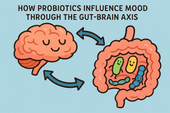
How Probiotics Influence Mood Through the Gut-Brain Axis
Discover how probiotics can do more than support your digestion—they can actually uplift your mood. This article explores the fascinating gut-brain axis and how balancing your gut bacteria through probiotics may help reduce anxiety, improve emotional stability, and support long-term mental well-being. 🌿🧠
-
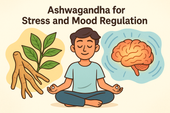
Ashwagandha for Stress and Mood Regulation
Discover how Ashwagandha, the powerful adaptogenic herb 🌿, helps your body manage stress and regulate mood. Learn how it balances cortisol, boosts GABA and serotonin, and supports emotional stability — helping you feel calm, focused, and resilient every day.
-
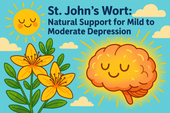
St. John’s Wort: Natural Support for Mild to Moderate Depression
Discover how St. John’s Wort, the “sunshine herb” 🌼, naturally supports mild to moderate depression. Learn how it boosts serotonin, balances mood, and promotes emotional resilience — with research showing its effectiveness compares to antidepressants, but with fewer side effects.
-
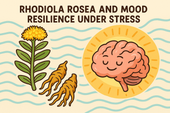
Rhodiola Rosea and Mood Resilience Under Stress
Discover how Rhodiola rosea helps your body adapt to stress 🌿. Learn how this powerful adaptogen balances cortisol, supports serotonin and dopamine, and strengthens emotional resilience — helping you stay calm, focused, and energized under pressure.
-
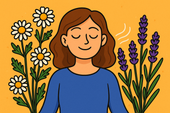
Chamomile and Lavender: Herbal Calm for Emotional Fluctuations
Discover how chamomile and lavender bring calm to emotional ups and downs 🌿. Learn how these two soothing herbs balance your nervous system, ease anxiety, and support restful sleep — naturally helping you find peace and emotional stability.
-
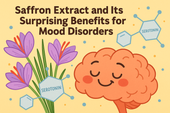
Saffron Extract and Its Surprising Benefits for Mood Disorders
Discover how saffron extract — the golden spice of joy 🌸 — can naturally support mood balance, ease anxiety, and lift mild depression. Learn what science says about its serotonin-boosting power, the ideal dosage, and how this ancient remedy compares to modern antidepressants.
-
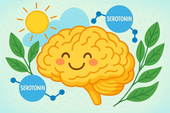
5-HTP and Serotonin: A Natural Path to Lifting Mood
Discover how 5-HTP naturally boosts serotonin 🌞 — the neurotransmitter behind mood, sleep, and emotional balance. Learn how this plant-derived compound supports happiness, reduces anxiety, and improves rest by helping your brain create more serotonin the gentle, natural way.
-
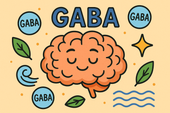
GABA Supplements for Reducing Anxiety and Mood Swings
Discover how GABA supplements can help reduce anxiety and balance mood naturally 🌿. Learn how this calming neurotransmitter works to quiet the mind, ease stress, and improve sleep — plus which nutrients and habits can boost your body’s own GABA production for long-term emotional stability.
-
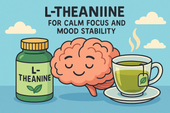
L-Theanine for Calm Focus and Mood Stability
Discover how L-theanine, the calming compound found in green tea 🍵, promotes focus, relaxation, and mood stability. Learn the science behind how it balances neurotransmitters, reduces stress hormones, and enhances clarity — helping you stay centered, calm, and productive without sedation.
-
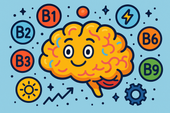
B Vitamins and Brain Chemistry: Supporting Energy and Emotional Balance
Discover how B vitamins power your brain chemistry ⚡. Learn how B6, B9, and B12 support serotonin, dopamine, and energy production — helping boost focus, mood, and emotional balance. From diet to supplements, explore how this vital nutrient group keeps your mind resilient and your energy steady.
-

N-Acetyl Cysteine (NAC) and Mood Disorders: What the Research Says
Learn how N-Acetyl Cysteine (NAC) supports brain health and mood balance 🧠. Discover how this antioxidant helps reduce oxidative stress, regulate glutamate, and improve emotional stability in depression, bipolar disorder, and anxiety — backed by cutting-edge psychiatric research.
-

Supplements for Bipolar Disorder: What May Support Stability
Discover the best supplements for bipolar disorder 🌿 that may support emotional stability and brain health. Learn how nutrients like omega-3s, magnesium, vitamin D, and NAC can help reduce inflammation, balance neurotransmitters, and complement traditional treatment safely.


















































